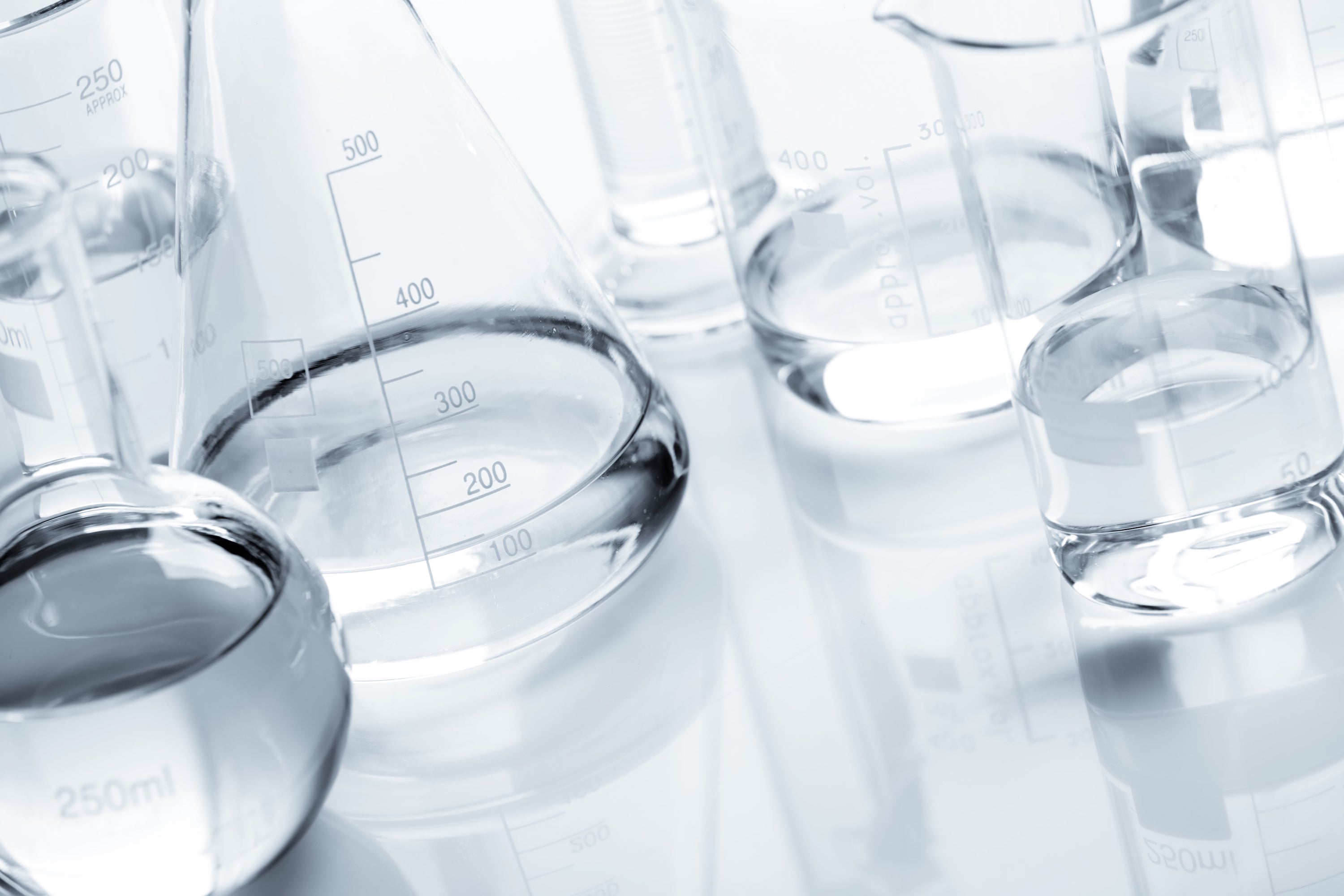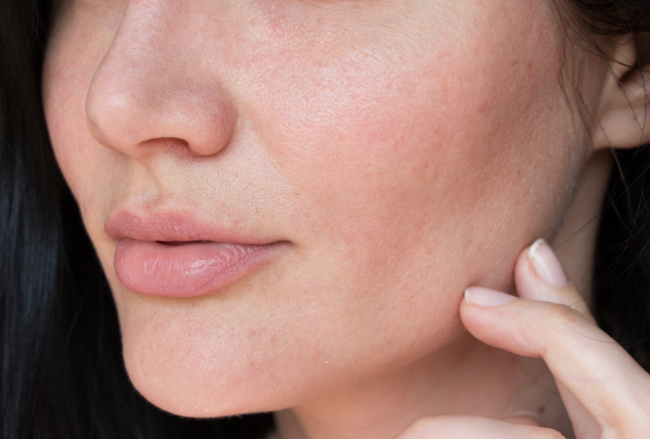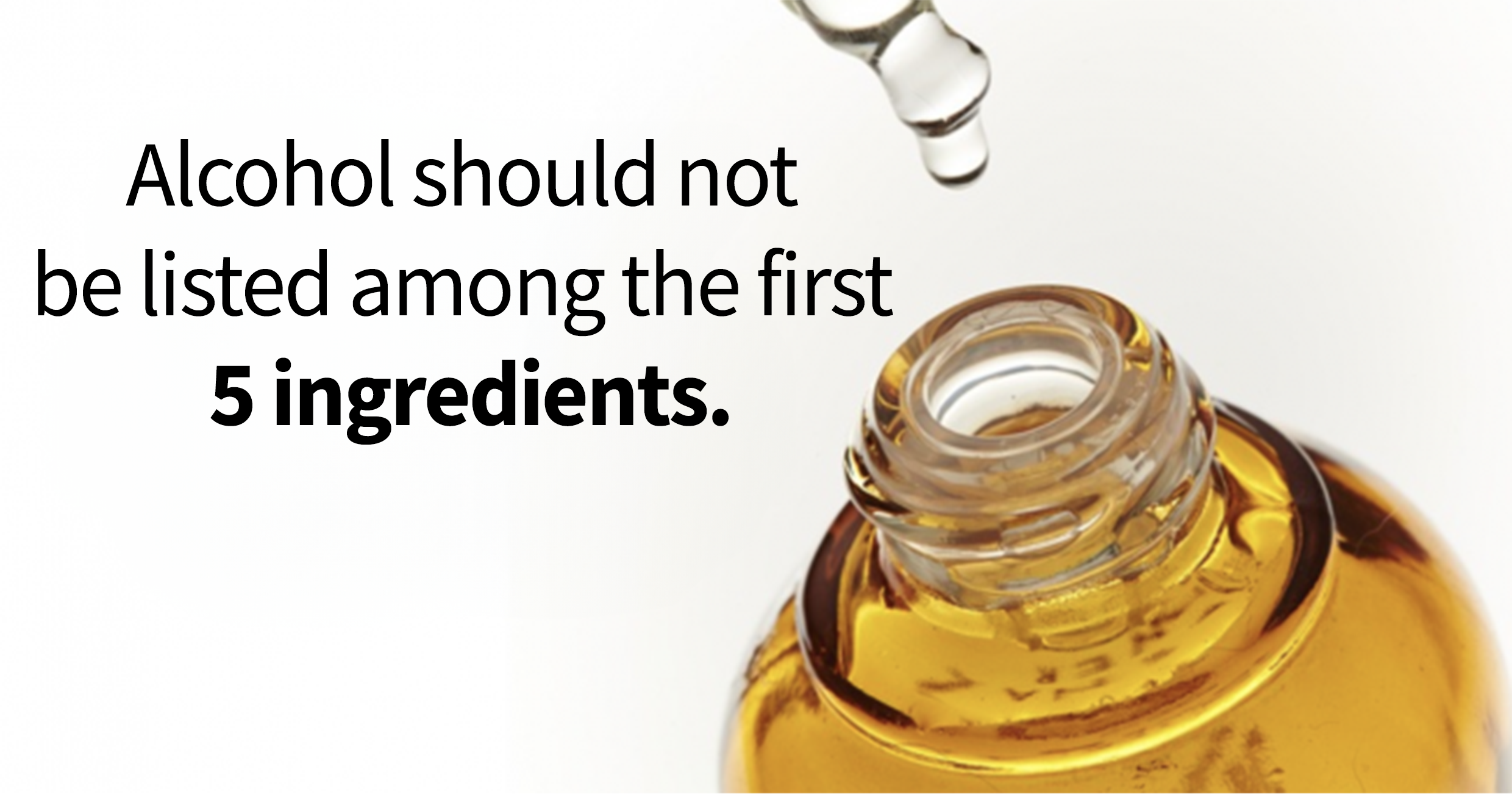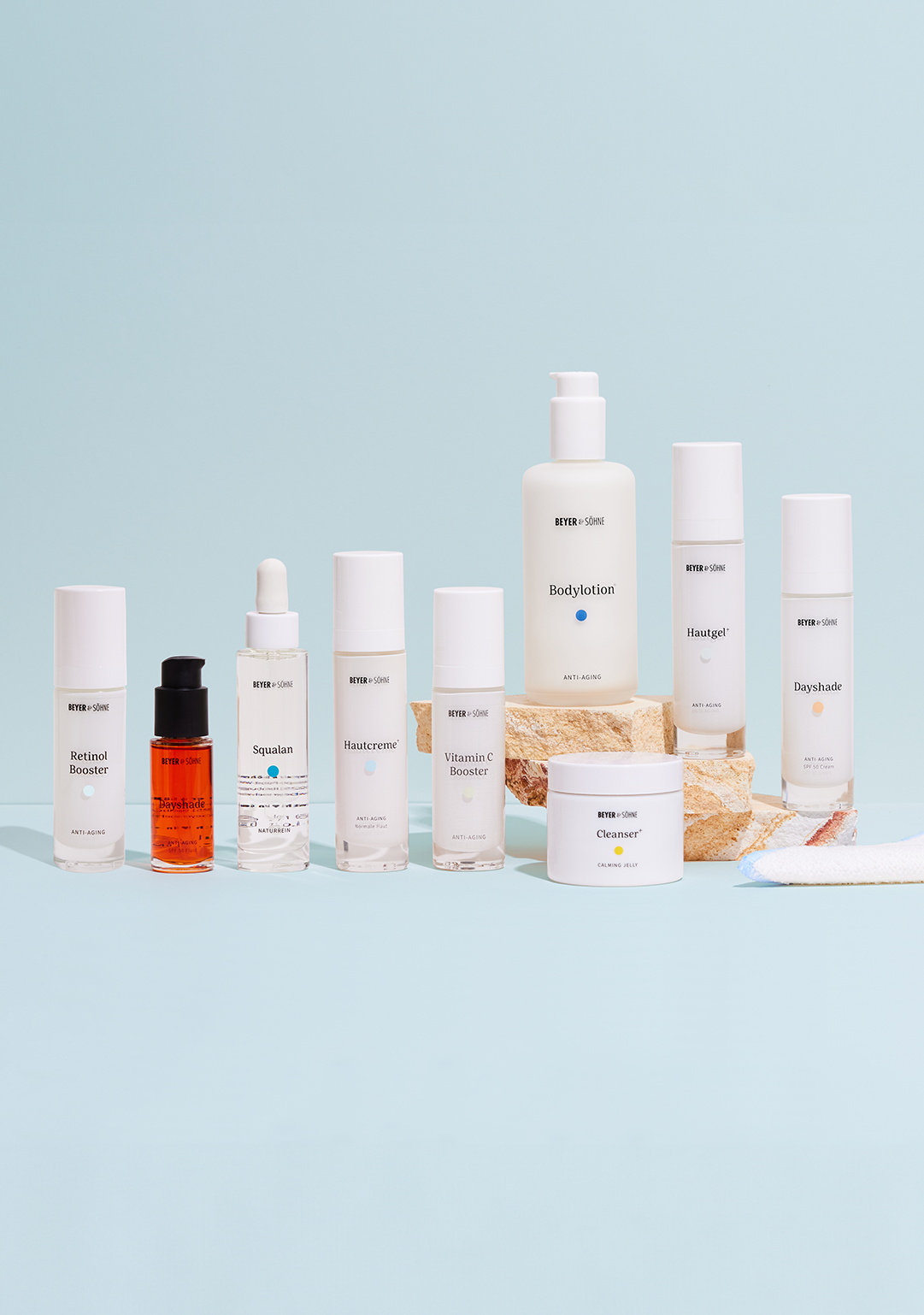An Overview of Cosmetic Alcohols
Alcohol in Cosmetics – Friend or Foe?
Does alcohol wreak havoc on the skin, or are skincare products with alcohol perfectly fine? The debate around alcohol in skincare is ongoing, but here's the lowdown: not all alcohols are created equal. In this guide, we'll delve into the nuances of identifying 'good' and 'bad' alcohols and explore whether skincare featuring pure alcohol is a foe to your skin.

Robby Beyer
September 2024

Table of Contents
So, What’s the Deal with Alcohol?
How to Distinguish Good and Bad Alcohols
What 'Bad' Alcohol Does to the Skin
Skin Aging Due to Alcohol and Free Radicals
At What Concentration is Alcohol Harmful?
Caution: Alcohol in Sunscreens
Why is Bad Alcohol Used in Creams?
Alcohol is Light and Mattifying
Alcohol as a Solvent and Preservative
Alcohol Improves the Skin’s Ability to Absorb Substances
Organic Alcohol for Natural Cosmetics
Compatible Alternative to Alcohol: The Diols
Fatty Alcohol: The 'Good' Alcohol in Cosmetics
Conclusion
So, What’s the Deal with Alcohol?
When we talk about alcohol, we're usually referring to
ethanol
, the kind found in alcoholic beverages. Ethanol has a reputation for being irritating, making it less than ideal for gentle skincare. Look for it in ingredient lists under names like
Alcohol
,
Alcohol Denat.
,
SD Alcohol
, or
Ethanol
.
Here's the catch: '
Alcohol' isn't a one-size-fits-all term
. Chemically speaking, alcohols encompass a broad range of organic compounds. So, when you see '
Alcohol
' in various combinations on an ingredient list, not all of these alcohols are harmful.
In the world of cosmetics, alcohols fall into
two camps
: the
'good' ones
that nurture and moisturize the skin, often referred to as fatty alcohols, and the
'bad' ones
that strip away moisture, harm cells, and contribute to premature aging. Ethanol falls into the latter category.
How to Distinguish Good and Bad Alcohols
What types of alcohols are present in cosmetics? You can easily identify 'bad' alcohols in skincare with this list:
Good Alcohols
:
Cetyl Alcohol, Cetearyl Alcohol, Stearyl Alcohol, Lauryl Alcohol, Myristyl Alcohol, Palmitoleyl Alcohol, Oleyl Alcohol, Arachidyl Alcohol, Lanolin Alcohol, C 14-22 Alcohols
Bad Alcohols
:
Alcohol Denat., Alcohol, Ethanol, Ethyl Alcohol, SD Alcohol, Methanol, Propyl Alcohol, Propanol, Isopropanol, Isopropyl Alcohol, Benzyl Alcohol, Phenethyl Alcohol
What 'Bad' Alcohol Does to the Skin
The most well-known representative of alcohols is what we commonly call ethyl alcohol or spirits. While people often refer to it as pure alcohol, it's not chemically accurate. We label it as 'bad' alcohol and scrutinize it closely.
However, it's not just ethyl alcohol that has detrimental effects on the skin. The following issues apply to all 'bad' alcohols. It is advisable to use alcohol-free cosmetics or products without irritating alcohols.
Alcohol Damages the Skin Barrier
Alcohol harms the skin barrier and causes dehydration, promoting inflammation and infections. A robust skin barrier provides protection and keeps our skin well-hydrated, slowing down the aging process and the formation of wrinkles. Therefore, opting for alcohol-free skincare or products without irritating alcohols can help strengthen our skin barrier.

If alcohol is overdosed, the skin may appear dry and irritated.
Alcohol and Free Radicals
Alcohol contributes to increased production of free radicals. These unstable molecules damage our skin and collagen framework, responsible for firm skin. In the worst case, alcohol may initiate programmed cell death (apoptosis), leading to the demise of healthy cells.
Free radicals, along with dehydration, are among the main culprits for the formation of wrinkles.
Alcohol and Skin Diseases
Alcohol worsens many skin conditions, from eczema to acne. Formulations containing alcohol can also predispose individuals to dermatitis, an inflammatory skin reaction. Therefore, alcohol should be avoided, especially by those with skin problems.
Alcohol is Irritating
Products with high alcohol concentration can dry out and irritate the skin in the long run. Extra caution is advised around the eye area. Due to the particularly thin skin, it is generally recommended to avoid alcohol altogether. Discover what makes a good eye care routine in this article.
Alcohol and Skin Allergies
Good news concerning allergies—reactions to alcohol are extremely rare. That's why the cosmetic industry often uses alcohol. When it comes to allergies, fragrance compounds are more likely to be problematic.
Alcohol Promotes Skin Aging
All these harmful effects of alcohol contribute to premature skin aging. Therefore, alcohol has no place in anti-aging skincare. In this article, you'll discover which anti-aging ingredients can help keep your skin healthy and beautiful for a long time.
Skin Aging Due to Alcohol and Free Radicals
Have you heard of free radicals? These molecules are the main culprits behind our skin aging. Many vitamins are considered healthy because they neutralize free radicals.
Substances with this ability are called
antioxidants
. Alcohol diminishes the positive effects of antioxidants. That's why every good skincare product includes antioxidants but avoids alcohol.
Which antioxidants are particularly effective? Vitamin C is an effective radical scavenger with proven results. Vitamin A is considered a classic anti-aging vitamin. There are also plant-based antioxidants: Resveratrol is the substance that makes grapes healthy. Astaxanthin is considered the most powerful antioxidant globally. That's why we've integrated all these potent substances into our products.
At What Concentration is Alcohol Harmful?
As almost everywhere, the rule applies to alcohol as well: The dose makes the poison. Alcohol is concerning when it ranks among the
first five ingredients
on the INCI list. This is, of course, only a rule of thumb. It always depends on the overall formulation.

Rule of thumb: 'Alcohol' should not be among the first 5 ingredients.
If alcohol is listed near the top, the alcohol content in the product is too high. On the other hand, if it appears as one of the last ingredients, there is not necessarily a risk of skin-damaging effects.
A small exception is
denatured alcohol
(
INCI: Alcohol Denat.
). This is denatured or altered alcohol, made undrinkable to avoid alcohol taxes. Unfortunately, denaturing agents are not good for our skin health. They often lead to allergies and irritations. We generally advise against using
Alcohol Denat
.
Caution: Alcohol in Sunscreens
Due to its light feel on the skin, alcohol is frequently incorporated into sunscreens, often in significant concentrations. However, alcohol can be especially detrimental when exposed to sunlight. In addition to the impact of UV rays, it places additional strain on the skin. Consequently, it is advisable to steer clear of ingredients like Alcohol Denat. and other forms of alcohol listed on the product. Explore further to understand what other factors to consider for effective sunscreens.
Why is Bad Alcohol Used in Creams?
Alcohol is Light and Mattifying
Alcohol can make products feel feather-light and weightless on the skin. Additionally, alcohol can mattify or instantly "de-grease" the skin.
Alcohol dissolves the protective fat from our top skin layer, the stratum corneum. So, alcohol acts similarly to surfactants, a substance group related to alcohol. Surfactants provide degreasing power in cleansing products and shampoos.
For people with oily skin, this might sound tempting at first. But beware! Not everything that glitters, or in this case, doesn't shine, is gold. Our skin ends up producing even more oil within a short time. In the long run, the skin problem worsens due to alcohol. Therefore, alcohol is contraindicated and not recommended for acne-prone skin.
Alcohol as a Solvent and Preservative
Alcohol can mix with both water and fat. This property allows alcohol to dissolve active ingredients and contribute to an even distribution in cosmetic formulations.
But that's not all: Alcohol also prevents the growth of germs and bacteria in cosmetic products, making it suitable as a preservative.
Alcohol Improves the Skin’s Ability to Absorb Substances
Moreover, alcohol is often used as a 'penetration enhancer.' It improves the skin's ability to absorb substances. Active ingredients, such as Vitamin C, can be transported more effectively into the deeper layers of the skin thanks to alcohol.
Organic Alcohol for Natural Cosmetics
Alcohol is commonly used in natural cosmetics, and it can easily be purchased organically. Until recently, there were few alternatives for natural cosmetics. However, this has changed. In the next paragraph, we'll introduce dioles as a compatible alternative.
Compatible Alternative to Alcohol: The Diols
Fortunately, there is a skin-friendly alternative to harmful alcohol:
diols
(Pentylene Glycol, Propylene Glycol, Propanediol, or Butylene Glycol). They serve similar functions to alcohol.
Diols have a significant advantage. Even in higher concentrations, they are extremely well-tolerated. They don't dry out our skin but instead provide moisture.
A particular diol, Pentylene Glycol, is becoming increasingly popular among manufacturers of high-quality and low-irritation cosmetics. Nowadays, there is Pentylene Glycol suitable for natural cosmetics as well. Therefore, even organic cosmetics no longer need alcohol. Nowadays, there are no excuses for using harmful alcohol in cosmetics.
By the way, we also use
Pentylene Glycol
in our Hautcreme+. It serves as a compatible preservative and 'penetration enhancer.'
Fatty Alcohol: The 'Good' Alcohol in Cosmetics
Belonging to the category of 'good' alcohols are the so-called
fatty alcohols
and
wax alcohols
. These are alcohols with long molecules. Typical representatives in cosmetics include Cetyl, Cetearyl, and Stearyl Alcohol.
Fatty alcohols do not dry out the skin or cause irritation. On the contrary, they support the skin barrier and help retain moisture. Therefore, fatty alcohols are often used as a cream base.
Conclusion
In conclusion, alcohol is a
misunderstood substance
. Ethanol makes cosmetic products lightweight, mattifies the skin, and provides a pleasant finish. However, this occurs at the expense of increased free radical formation, skin drying, and inflammation. In high doses, alcohol promotes skin aging. Nowadays, diols like
Pentylene Glycol
serve as a skin-friendly alternative to alcohol in cosmetics.
Fatty alcohols
(e.g., Cetyl and Stearyl Alcohol) moisturize and support the skin barrier without any negative effects. Therefore, they often serve as the basis for creams.
At Beyer & Söhne, we do not use 'bad' alcohols. None of our products contain conventional alcohol, not even in very small concentrations.
Sources
Sicherheitsbewertung zu Alkohol auf der Haut –
Safety evaluation of topical applications of ethanol on the skin and inside the oral cavity
Studie zu den Fetten in unserer Haut –
Epidermal surface lipids
Studie zu Fettsäuren als ‚Penetration Enhancer‘ –
Status of fatty acids as skin penetration enhancers-a review.
